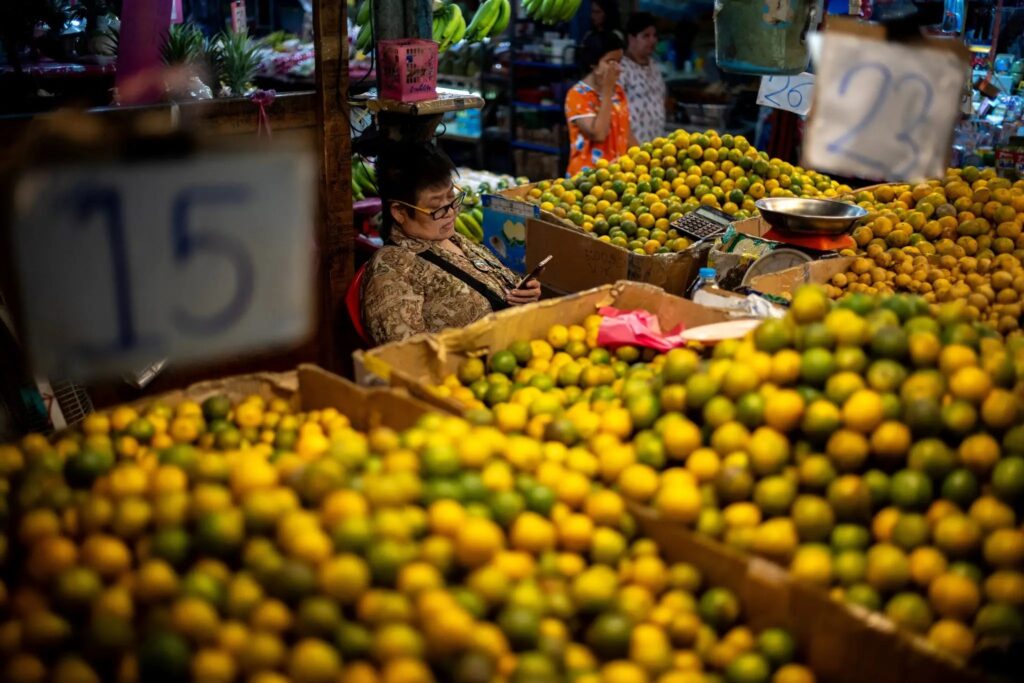Recipients can use the one-off digital cash handout at local businesses within a four kilometre radius of the recipient’s registered address. The Srettha government projects that the scheme will boost cash flow to the economy by over 2 trillion Thai baht — four times the cost of the policy.
Like many countries, the Thai economy was hit hard by the COVID-19 pandemic. Its GDP fell by 6.1 per cent in 2020, the largest contraction since the 1997 Asian Financial Crisis. The number of people living in poverty has risen by almost half a million and economic forecasts appear grim.
But it is still unclear whether the digital wallet scheme can solve the socioeconomic issues Thailand is facing. Poverty was rising in Thailand even before the pandemic despite mild economic growth, with the country ‘caught in a middle income trap of its own creation’ after the end of the rapid growth of the 20th century.
The Thai economy faces several unique challenges, including persistent income inequality, an aging population, air pollution and a deteriorating education system. This is not to mention the uneven impacts of the COVID-19 pandemic on informal workers and children, especially those from low-income families.
Instead of prioritising these issues, the Srettha government is mobilising 560 billion baht (US$15.8 billion), or more than 10 per cent of Thailand’s 2024 pending fiscal budget of 3.48 trillion baht (US$98 billion), to fund this digital wallet scheme.
It is unwise to focus on economic growth through consumption spending as a magic bullet for complex socioeconomic problems. Dozens of high-profile economists, including two former national bank chiefs, have come out against the stimulus scheme.
Thailand is not new to this kind of cash handout scheme. Since October 2017, the government has had a state welfare card scheme that provides unconditional cash transfers to the poor. This is arguably the largest unconditional cash transfer program ever implemented in the country and covers over 20 per cent of the country’s population.
Each month, a welfare cardholder receives between 200 and 300 baht (US$5–8) to spend at registered shops across the country. This policy was a key issue in the May 2023 general election, with both the Palang Pracharath Party and the Ruam Thai Sang Chart Party promising to increase cardholders’ monthly allowances.
This state welfare card program has suffered from targeting errors. According to the National Economic and Social Development Council’s estimates, it fails to reach 50 per cent the poor, and 90 per cent of the beneficiaries do not fall under the national poverty line.
The failure to address these targeting errors over the past five years does not make a strong case for more large-scale cash transfers. While the digital wallet stimulus policy might address the shortcomings of the state welfare card scheme by reaching a larger number of people, Bangkok must ensure that the digital stimulus reaches those most in need.
Even if the government achieves this, many predict that the stimulus will be a net loss — in other words, that the fiscal multiplier of the scheme could be less than one. The size of the effect depends on how much money is reinvested and circulated within the country. Put simply, the multiplier effect will be higher if people spend more on locally produced goods.
More open countries are likely to have lower fiscal multipliers attached to economic policies because of larger demand leakage through imports. Thailand is a small and open economy where imports of goods and services accounted for 68.1 per cent of GDP in 2022. Undue emphasis on spending on domestically produced goods does more harm than good, since consumers eventually bear the cost through higher prices.
Thailand has experienced development gains from trade by participating in global value chains for decades. A more sensible policy alternative to promote short-run economic growth would be to reinforce global value chains and generate a favourable investment climate for foreign direct investment into areas where Thailand has comparative advantage. Examples are labour-intensive activities in electronics, appliances and the automotive sector. Such a business environment could be created through further FDI liberalisation and deregulation of the domestic economy.
Thailand will have to navigate several threats to globalisation, including rising protectionism and the possibility of a global minimum corporate tax. The digital wallet stimulus policy will not help the country prepare for such disruptions.
The ability to deliver economic growth is a key performance indicator of any new government. This digital wallet scheme seems poised to temporarily increase the size of Thailand’s economy at the expense of other economic and social issues central to Thailand’s sustainable and resilient economic development. It is a race to nowhere.
Source: East Asia Forum


